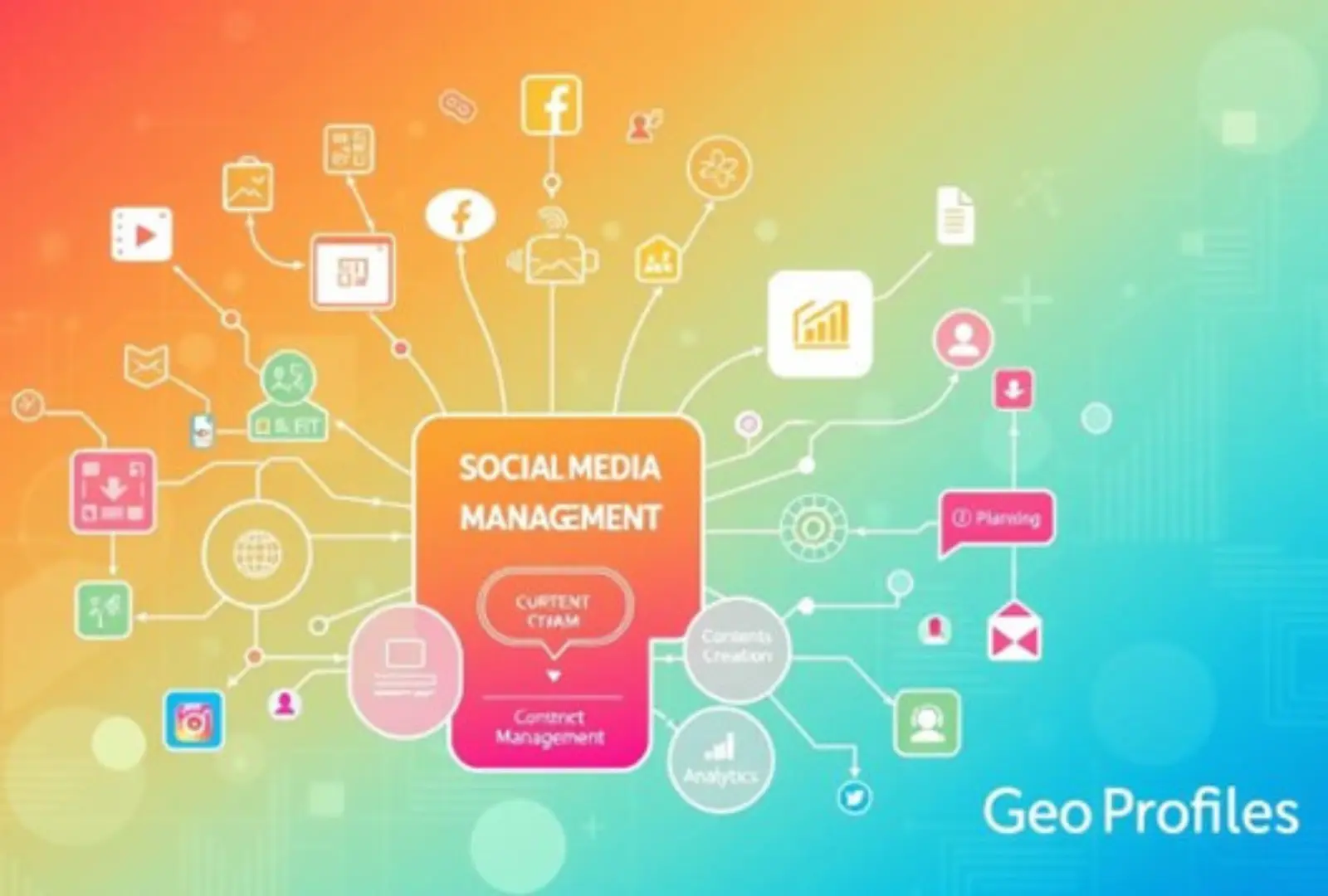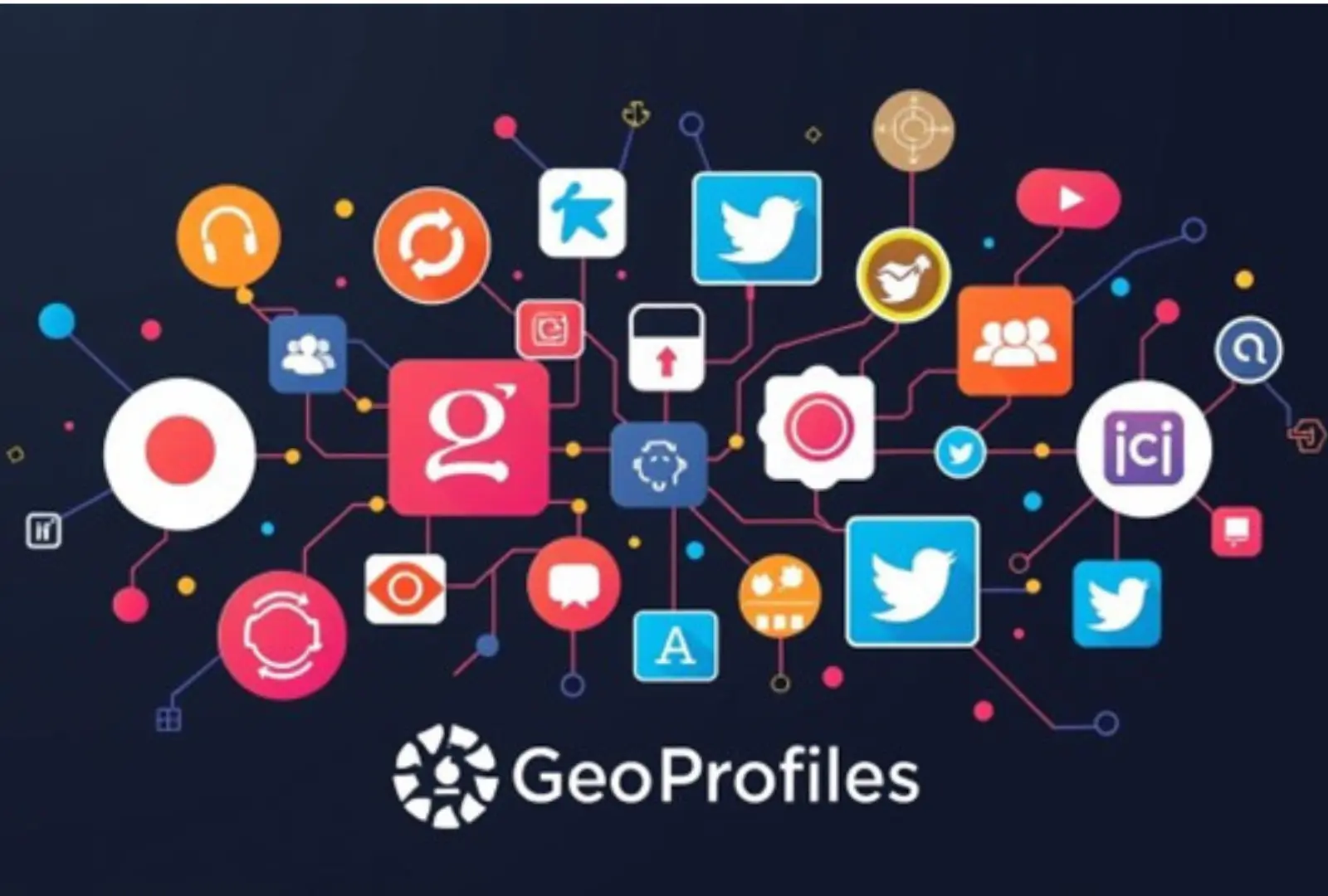Social media management is crucial today. It helps businesses save time, boost engagement, and grow their brand. It offers effective strategies and tools for this.
With more platforms and users, a good strategy is essential. This guide will cover the benefits and what to expect. We’ll show how it can help businesses grow online with the right tools and strategies.

We aim to help businesses win with social media management. By using the right strategies and tools, they can boost their online presence and reach their audience better.
Introduction to Social Media Management
SMM is vital for a strong online presence. We’ll look at its importance and how it helps businesses reach their goals.
Key Takeaways
- Good SMM strategies save time and boost engagement.
- Tools are key for a successful social media strategy.
- A solid strategy is essential for a strong online presence.
- SMM helps businesses grow online.
- Our guide will overview the benefits and what to expect.
Understanding Social Media Management in Today’s Digital Landscape
SMM is key for small businesses to have a strong online presence. It helps them connect with their audience. Good SMM can boost brand awareness, drive website traffic, and get more leads.
To succeed, businesses need to know the best SMM tips and strategies. This knowledge is crucial for their online success.
Effective SMM involves several important steps. These include making engaging content, talking to followers, and checking analytics. By using these steps, businesses can create a solid social media plan that fits their marketing goals.
Key Components of Modern Social Media Management
- Content creation and curation
- Engagement and community building
- Analytics and performance tracking
- Advertising and promotion
By using these components, small businesses can increase their online presence. They can also build stronger relationships with their audience. This can lead to business growth. As we explore SMM further, we’ll share more insights and tips for small businesses.

Core Benefits of Professional Social Media Management
Professional SMM is key in today’s digital world. It boosts brand awareness, improves customer interaction, and enhances reputation. With the right tools, small businesses can manage their online presence better and reach more people.
Some main benefits include:
- Improved brand consistency across all social media platforms
- Enhanced customer engagement through targeted content and responsive communication
- Increased website traffic and lead generation through strategic social media advertising
- Better data analysis and performance tracking to inform future marketing decisions
Investing in professional SMM helps businesses stay competitive. It’s crucial to keep up with digital changes and use the best tools and strategies for success.

Successful SMM comes from understanding its benefits and using the right tools. This way, companies can maximize their online presence and achieve significant results.
Essential Components of an Effective Social Media Strategy
We know how important social media is for e-commerce brands and startups. A good strategy is key to success online. When making a social media plan, several things must be thought about to make it work.
Creating great content is crucial. It helps set a brand’s voice and tone. Consistency is key to making content that people want to see. Also, talking to your audience through comments and messages is important for a strong online presence.
Some key parts of a good social media plan include:
- Content planning and creation
- Audience engagement tactics
- Brand voice development
- Crisis management protocols
These parts work together to make a full plan. This plan helps businesses, like e-commerce brands and startups, reach their online goals.

By adding these parts to a social media plan, businesses can manage their online space well. They can talk to their audience and increase sales. Whether it’s for e-commerce brands or startups, a good plan is vital in today’s digital world.
| Component | Importance |
|---|---|
| Content planning and creation | High |
| Audience engagement tactics | High |
| Brand voice development | Medium |
| Crisis management protocols | Medium |
Choosing the Right Social Media Management Tools
Finding the right social media tools is key for our business. We explore various SMM platforms, SMM software, and agency options. Each tool offers unique features to enhance our online presence and connect with more people.
When evaluating these tools, we consider ease of use, scalability, and compatibility with our existing systems. SMM platforms like Hootsuite and Sprout Social manage multiple accounts at once. SMM software such as Buffer and Sendible focus on scheduling and tracking. Working with a social media management agency provides access to their expertise and resources.
Key factors to consider when selecting social media tools include:
- Cost and pricing models
- Customer support and training
- Customization and flexibility
- Integration with other marketing tools
By carefully evaluating these aspects and choosing the best tools, we can enhance our online marketing efforts. This leads to increased engagement and business growth. It’s crucial to stay updated with the latest in social media management platforms, social media management software, and social media management agency services.

The right tools can help us achieve our online marketing goals. They enable us to build a strong and lasting digital presence.
| Tool | Features | Pricing |
|---|---|---|
| Hootsuite | Social media scheduling, analytics, and engagement | Custom pricing for businesses |
| Buffer | Content scheduling, analytics, and team collaboration | $15-$65 per month |
| Sprout Social | Comprehensive social media management and analytics | Custom pricing for businesses |
Platform-Specific Management Strategies
Each social media platform is unique, with its own features and benefits. To manage our online presence effectively, we need to understand these differences. This includes Instagram, Facebook, LinkedIn, and TikTok.
For instagram management tools, we focus on creating engaging visual content. We also use relevant hashtags to reach more people. On the other hand, facebook page management tips focus on building a strong community. We encourage users to share their own content.
For linkedin social media management, we highlight our professional skills. We share news and updates related to our industry.
Some important things to consider for each platform include:
- Content format: visual, text-based, or a mix
- Target audience: who they are, what they like, and what they do
- Engagement strategies: how to interact with users, use hashtags, and run contests
By understanding what makes each platform unique, we can use the right tools and strategies. This helps us optimize our online presence and reach our social media goals.
| Platform | Key Strategy |
|---|---|
| Visual content creation and hashtag optimization | |
| Community building and user-generated content | |
| Professional expertise showcase and industry-related content sharing |
Building and Managing Your Content Calendar
Planning and scheduling content is crucial for social media success. A good content calendar helps organize posts across different platforms. It makes our content creation smoother and keeps our online look consistent.
When making a content calendar, think about who you’re talking to. Create content that speaks to them. Here’s how to make a calendar:
- Define our content goals and objectives
- Identify our target audience and their preferences
- Plan and schedule content in advance using social media management scheduling tools
- Monitor and adjust our content calendar regularly
By following these steps and using scheduling tools, we can make a calendar that meets our social media goals.
| Content Type | Platform | Schedule |
|---|---|---|
| Blog Post | Monday, 10am | |
| Infographic | Tuesday, 2pm | |
| Video | Wednesday, 12pm |
By using social media management for content creators and scheduling tools, we can improve our online presence. This helps us reach our social media goals.
Analytics and Performance Tracking in Social Media Management
Tracking performance and analyzing data is vital in social media management. This is true for local businesses and nonprofits alike. By watching key metrics, we can improve our strategies to reach our audience better and meet our goals.
There are several important metrics to keep an eye on. These include engagement rates, website traffic, and conversion rates. These help us understand how well our social media campaigns are doing and where we can get better.
Key Performance Indicators
- Engagement rates: likes, comments, shares
- Website traffic: page views, unique visitors
- Conversion rates: sales, donations, sign-ups
By looking at these metrics, we can see how much our social media efforts are worth. This is really important for local businesses and nonprofits. They often have limited resources, so every dollar matters.
Good reporting is also key in social media management. We share regular reports on our performance to show the value of our work. This helps us make smart choices for the future.
Overcoming Common Social Media Management Challenges
We often face challenges in managing social media, like creating engaging content for social media management for restaurants or real estate agents. These hurdles can seem daunting, but there are solutions.
Some common challenges include:
- Creating engaging content that resonates with the target audience
- Managing multiple social media platforms and maintaining a consistent brand voice
- Measuring the return on investment (ROI) of social media campaigns
To tackle these challenges, we can create a detailed social media strategy. This strategy should cover content planning, audience engagement, and tracking performance. Using social media management tools helps us work more efficiently. This way, we can focus on making high-quality content that boosts engagement and conversions.
For example, social media management for restaurants might mean sharing delicious content like menu items and promotions. On the other hand, social media management for real estate agents could involve posting virtual tours and property listings. Knowing our audience well helps us create content that speaks to them and drives results.
By tackling common social media management challenges, we can fully leverage social media for business growth. Whether we’re working with restaurants, real estate agents, or other industries, staying focused on our goals is key. We must also adapt to the changing social media world.
| Challenge | Solution |
|---|---|
| Creating engaging content | Develop a content calendar and use social media management tools |
| Managing multiple platforms | Use a social media management dashboard to streamline workflow |
| Measuring ROI | Use analytics tools to track performance and adjust strategies |
Advanced Automation and AI in Social Media Management
We’re exploring advanced automation and AI in social media management. This includes automated posting, AI analytics, and chatbots. It’s important to understand the pros and cons of these tools.
When choosing a social media tool, look for ones that automate posting. This saves time and boosts efficiency. Hootsuite, Buffer, and Sprout Social are great options. They let us schedule posts ahead of time, keeping our content consistent across platforms.
AI analytics tools also offer deep insights into our social media performance. They help us fine-tune our strategy and boost engagement. To start automating, follow these steps:
- Identify our social media goals and objectives
- Choose a social media management tool that meets our needs
- Set up automated posting solutions and AI-powered analytics tools
- Monitor and refine our strategy based on the insights gained
By using advanced automation and AI, we can make our workflow smoother. This improves our online presence and boosts our success chances.
Emerging Trends Shaping Social Media Management
We’re seeing big changes in how we manage social media, thanks to new trends for 2024. It’s crucial to keep up with these changes and how they affect our plans. Gen Z is leading the way, wanting more real and interesting content.
New trends include using artificial intelligence, virtual reality, and augmented reality. These tools help create deeper experiences. Brands will use these technologies more in 2024. Also, focusing on Gen Z’s needs will become even more important.
Here are some key trends to watch:
- Increased use of social media management tools to streamline content creation and distribution
- Greater emphasis on social media management for gen z audiences, with a focus on authenticity and engagement
- More brands incorporating artificial intelligence and machine learning into their social media management trends 2024
Looking ahead, staying ahead means understanding these new trends. By focusing on 2024 trends and Gen Z, we keep our brands relevant and competitive.
By embracing these trends and focusing on Gen Z, we can make our social media strategies better. This will help us engage more, build brand awareness, and grow our business.
| Trend | Description |
|---|---|
| Social media management trends 2024 | Emphasis on artificial intelligence, virtual reality, and augmented reality |
| Social media management for gen z audiences | Focus on authenticity, engagement, and creating content that resonates with gen z |
Best Practices for Sustainable Social Media Growth
We know that growing your social media in a sustainable way is key for businesses. This is true, more so for those in video content and sustainability brands. A good strategy is one that connects with your audience and offers lasting value.
Our method focuses on building a community, improving engagement, and aiming for long-term success. By making content that meets the audience’s needs, we build a loyal group. This group helps your business grow in a sustainable way.
Community Building Strategies
Building a strong community starts with knowing what your audience likes and does. For video content, it’s about understanding what content they find engaging. This helps in creating content that they love.
Engagement Optimization Techniques
Boosting engagement is key for lasting social media growth. We use tools to track how well our content is doing. This lets us adjust our strategy to better meet our audience’s needs. For sustainability brands, it’s about creating content that not only engages but also reflects their values.
Long-term Success Factors
Your social media strategy must match your marketing goals for lasting success. Set clear goals, track your progress, and adjust your plan as needed. This approach helps your social media grow sustainably and keeps you competitive.
| Strategy | Benefits |
|---|---|
| Community Building | Increased engagement, loyalty, and brand awareness |
| Engagement Optimization | Improved engagement metrics, increased conversions, and enhanced brand reputation |
| Long-term Success Factors | Sustainable social media growth, increased brand visibility, and improved marketing ROI |
Conclusion
As we conclude, measuring social media success is crucial. Outsourcing these tasks can also be beneficial. By monitoring metrics like engagement and website traffic, we gain valuable insights. This helps us make informed decisions for our social media strategies.
Outsourcing to experts can be wise. It leverages their expertise and keeps us updated with digital trends. This frees us to focus on other business tasks. By following these tips, we can continue to grow our social media presence and thrive in the digital world.



